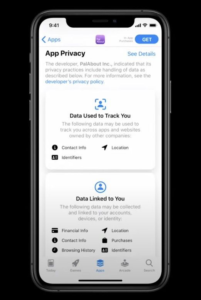Identity Review | Global Tech Think Tank
Keep up with the digital identity landscape.
Starting December 8, Apple will require developers to disclose what types of user data they collect through their applications. The Verge has named these labels “privacy nutritional labels,” as they aim to tell consumers how “healthy” or “safe” an app is to use before they download it.
Erik Neuenschwander, who serves as Apple’s user privacy manager, described Apple’s rationale for requiring privacy labels when announcing the policy change at Apple’s Worldwide Developer Conference in June: “For food, you have nutrition labels; you can see if it’s packed with protein or loaded with sugar, or maybe both, all before you buy it,” said Neuenschwander. “We thought it would be great to have something similar for apps.”

The above picture is a screenshot from Apple demonstrating how these privacy nutritional labels will work. As Apple noted in the announcement of the new requirement, prior to downloading an app, “users [will be able to] learn about some of the data types the app may collect, and whether that data is linked to them or used to track them.” Apple will present this information in a digestible fashion that allows users to make informed decisions. This new customer journey starkly contrasts with requiring users to read and consent to a terms and conditions agreement (which 99% of users skip) before downloading an app.
In order for developers to avoid the nutrition labels, the data they collect must meet the four following criteria:
Developers who build apps that do not meet the above criteria must not comply with the labels upon the original download of the app, but create a new label when the app’s data collection process changes. That means that app users will have a complete understanding of how and when their data is being collected, presented to them directly on their phone.
Apple’s new privacy labels are part of a larger bet on consumer privacy that has been of increasing importance to the company in the last five years. Apple’s unwillingness to hack into the phone of Syed Farook, in the December 2015 San Bernardino shooting, made national news. As peer company Facebook continues to deal with the fallout from lax data protection standards in the Cambridge Analytica scandal, Apple’s ability to tie itself to data privacy may produce dividends. Privacy has recently become central to Apple’s advertising campaigns and Identity Review, in a recent report exploring Gen-Z’s perceptions on the potential TikTok ban, found that over half of Gen-Z consider data privacy as “important” or “very important.”
Given that there are more than 900 million iPhone users worldwide, even slight changes to the Apple App Store policies can produce a sea change effect in developer standards and consumer expectations. By mandating its developers to practice data transparency with app users, Apple may usher in a new standard in data privacy in which consumers demand the right to know how, when and where their data is being used.
ABOUT THE WRITER
Quinn Barry is a Tech Innovation Fellow from Stanford University covering the next generation of financial identity protection.